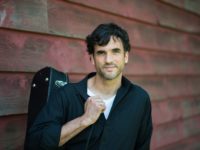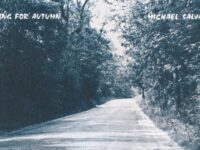It’s another season-themed set of songs from the advanced guitarist and composer Scott DuBois, but don’t think for a second that Autumn Wind is Winter Light, Part 2. A conceptualist with a thirst for new creative strategies doesn’t roll like that.
Autumn Wind (out in 2017 on Oct. 13th in North America, Oct. 27th in Europe and Nov. 3rd in Asia via ACT Records) is highly impressionistic like its 2015 immediate predecessor Winter Light, but this one is brimming with even more original ideas. DuBois composed a group of connected songs performed as a string quartet and woodwind quartet joining a jazz quartet. But here, the number twelve is the real theme: the twelve-tone technique is employed for twelve connected compositions, with an instrument added with each track, until there is DuBois’ usual jazz quartet complemented by the string quartet and woodwind quartet.
Though “Mid-September Changing Light” is DuBois alone, he exhibits such a complete mastery of the electric guitar’s tonal palette, making both the song both peaceful and rough-edged at once, full of timbral richness. His bassist Thomas Morgan joins him for “Late September Dusk Walk” but the feeling remains the same. However, Morgan almost immediately steps out to make woody, ardent statements that make clear why he’s Bill Frisell’s favored bass player of late.
Another member of DuBois’ regular quartet, reedist Gebhard Ullmann, begins his work on “Early October Insect Songs,” a bass clarinet that rings out while DuBois’ echoing guitar offers a harmonic counterpoint. By “Mid-October Migration,” the full quartet arrives with the addition of Kresten Osgood’s lively drums and while DuBois’ guitar is still streaming sounds of Americana, the unbound energy from the other three are an equal counterweight and eventually, DuBois engages with them directly.
The bass clarinet/guitar lead lines on “Late October Changing Leaves” is evocative of Ornette Coleman, with a cello helping to flash out the theme. With two stringed instruments now supplementing the base quartet, DuBois uses them to take up more sonic space with minimalist patterns on “Early November Bird Formations,” and Ullmann’s freeform outpourings from his tenor sax push hard against that structure.
“Autumn Wind” is a return to the pastoral peacefulness of the first three tracks, and even with seven instruments now, plenty of open space permeates the softly glowing resonance. “Mid-November Moonlit Forest” is the most straightforward attempt so far to marry classical with jazz, and the Third Stream sound is a blissful flow capped off by DuBois’ advanced bop figures whilst Osgood solos underneath.
The graceful, folk melody “Late November Farm Fields” is given a blues-drenched jazz touch by Ullmann’s bass clarinet, the backing instrumentation now including the first of the woodwinds unit. By the time we reach “Early December Blue Sky And Chimney Smoke,” it’s beginning to sound like an orchestra, but DuBois simply leverages that to fold in additional layers of complexity. Woodwinds chirp at each other against a heavy, atmospheric backdrop for “Mid-December Night Sky,” and with the full complement of twelve players participating on “Autumn Aurora Borealis,” the original quartet reasserts itself, running wild and free (especially Osgood and Ullmann on tenor sax), barely constrained by the twelve-tone row of the strings and woodwinds.
The two-violins/viola/cello string quartet briefly reprises “Mid-November Moonlit Forest” as a way to end the program as gently as it began.
DuBois’s desire to blur the lines between creative jazz, chamber music and folk forms is a quest others before him have taken on, but the challenge of putting it all together both coherently and provocatively is where many have fallen short. Not so with Autumn Wind, it excels at that.
- Tobias Meinhart – ‘Sonic River’ (2025) - April 22, 2025
- Ivo Perelman, with William Parker + Rashied Ali – ‘Sad Life’ (1996, 2025 reissue) - April 15, 2025
- Nels Cline – ‘Consentrik Quartet’ (2025) - March 31, 2025




